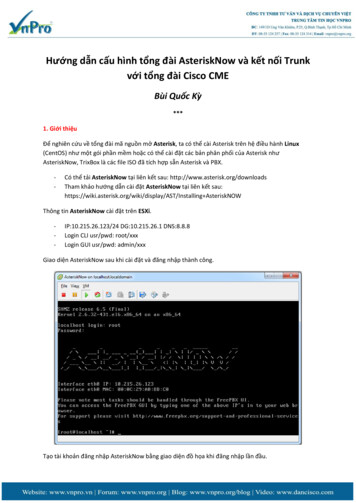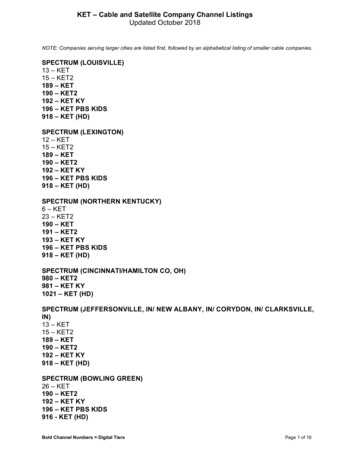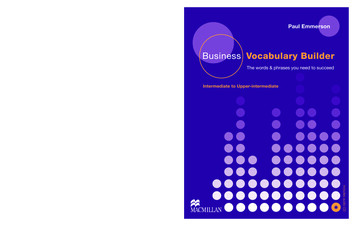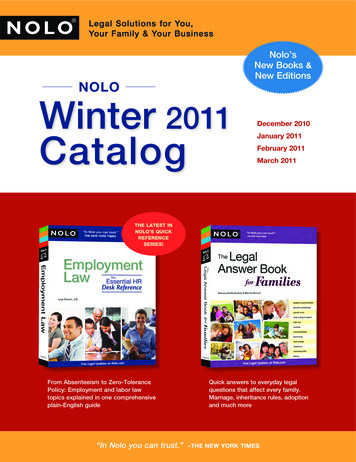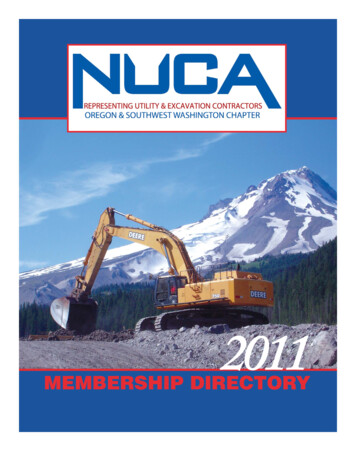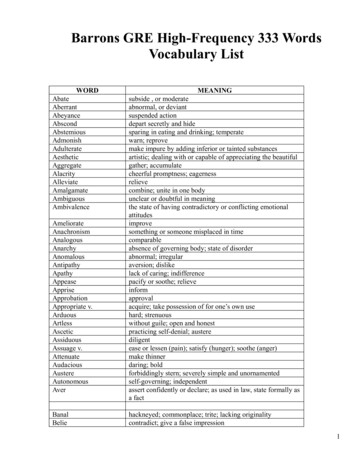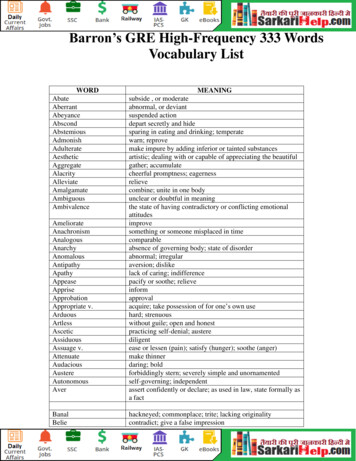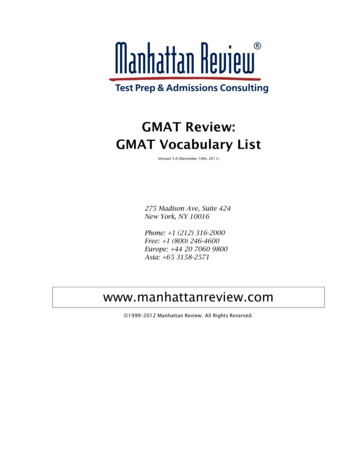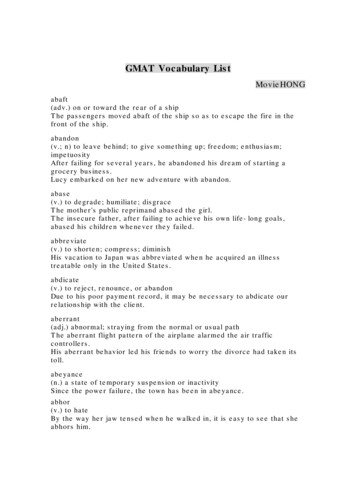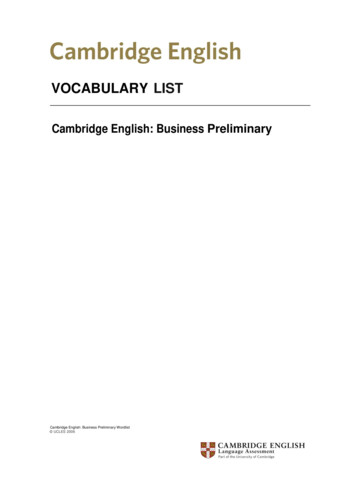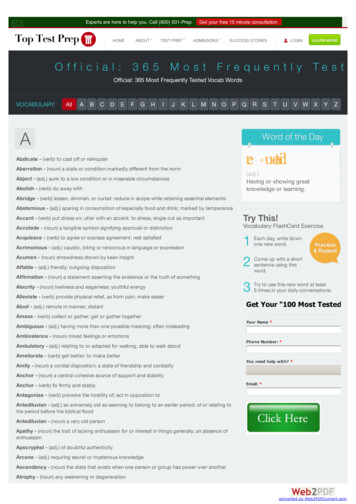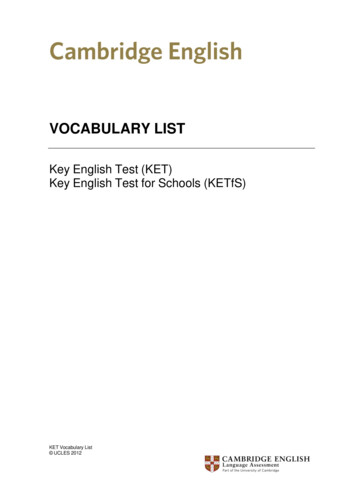
Transcription
VOCABULARY LISTKey English Test (KET)Key English Test for Schools (KETfS)KET Vocabulary List UCLES 2012
Introduction to the KET Vocabulary ListThe KET Vocabulary List gives teachers a guide to the vocabulary needed when preparingstudents for the KET and KET for Schools examinations.Background to the listThe KET Vocabulary List was originally developed by Cambridge ESOL in consultationwith external consultants to guide item writers who produce materials for the KETexamination. It drew on vocabulary from the Council of Europe’s Waystage (1990)specification and other vocabulary which corpus evidence shows is high frequency.The list covers vocabulary appropriate to the A2 level on the Common EuropeanFramework of Reference (CEFR) and includes receptive vocabulary (words that thecandidate is expected to understand but which is not the focus of a question) andproductive vocabulary (words that the candidate needs to know in order to answer aquestion).The list does not provide an exhaustive list of all words which appear on the KET and KETfor Schools question papers and candidates should not confine their study of vocabulary tothe list alone.How the list is updatedThe vocabulary of English changes over time, with words being added and other wordsfalling into disuse. In order to maintain its currency, the KET Vocabulary List is updated onan annual basis, with the decision to add or remove words being informed by reference tothe Cambridge Learner Corpus and English Vocabulary Profile.The Cambridge Learner Corpus is a collection of over 44 million words of English, basedupon evidence of language use by learners from all over the world and from which theEnglish Vocabulary Profile has developed. The English Vocabulary Profile shows themost common words and phrases that learners of English need to know in British orAmerican English. The meaning of each word or phrase in the wordlists has been assigneda level between A1 and B2 on the CEFR.A preview version of the English Vocabulary Profile can be accessed by visiting thewebsite: http://www.englishprofile.orgOrganisation of the list Word setsSome categories of words that a learner at this level might be expected to know, e.g. daysof the week, are not included in the alphabetical list but are listed in Appendix 1. Although‘grammar words’ (pronouns, modal verbs, etc.) are included, the Language Specificationssection of the KET and KET for Schools Handbooks (available fromwww.cambridgeesol.org) should be consulted for a more complete listing. ExemplificationExample phrases and sentences showing how words might be used are given only wherewords with different meanings need to be constrained. For example, bank is followed by ‘Ichanged my money in a bank’ – this shows that bank is limited to the idea of a financialinstitution: candidates are not expected to know other meanings, such as ‘a river bank’. UCLES 2012Page 2 of 29KET Vocabulary List
Multi-word verbsAll multi-word (or phrasal) verbs that a KET or KET for Schools candidate might beexpected to know are included in the list. These verbs include ‘literal’ verbs (i.e. where themeaning is transparent), e.g. sit down, go out and ‘non-literal’ verbs, e.g. look after, get up. Topic listsIn Appendix 2, words have been grouped together under common KET and/or KET forSchools themes, such as ‘Food and Drink’, ‘House and Home’ and ‘Sport’.Unsuitable topicsCambridge ESOL examinations must not contain anything that might offend or upsetcandidates, potentially affect their performance or distract them during the examination. Anumber of ‘sensitive’ topics are considered unsuitable for use in KET and KET for Schools,for example war and politics, and vocabulary relating to these is not included in the KETVocabulary List.Personal vocabularyThe content of the KET Vocabulary List is general in nature and is unlikely to covercompletely the productive vocabulary that may be required by candidates. Candidatesshould know the specific lexis they will need to describe themselves and their lives, forexample hobbies, likes and dislikes.AbbreviationsAbbreviations used in the KET Vocabulary List are:abbrevadjadvavAm EngBr Engconjdetexclamabbreviation or acronymadjectiveadverbauxiliary verbAmerican EnglishBritish Englishconjunctiondeterminerexclamationmvnphr vplprepprep phrpronsingvmodal verbnounphrasal verbpluralprepositionprepositional phrasepronounsingularverbSummary of points to be noted The list does not include every word that may appear on a KET or KET for Schoolspaper.The list covers receptive and productive vocabulary.The list is updated every year. UCLES 2012Page 3 of 29KET Vocabulary List
ContentsA . 5B . 6C. 7D. 9E . 10F . 11G . 12H. 11I . 12J . 12K . 12L . 13M . 14N. 15O. 15P . 16Q . 17R. 17S . 18T . 20U. 21V . 21W . 21Y . 21Z . 21Appendix 1. 21Cardinal numbers . 21Ordinal numbers . 21Days of the week . 21Months of the year . 21Seasons of the year . 21Countries, languages and nationalities . 21Continents . 21Health, Medicine and Exercise . 25 UCLES 2012Page 4 of 29KET Vocabulary List
Aa/an (det)ago (adv)apple (n)able (adj)agree (v)appointment (n) be able toabout (adv & prep) What about a cold drink? I have about 3. (adv) a book about animals (prep) Yes, I agree with you. Don’t you agree, Sam?an appointment with thedoctorarea (n)air (n) to travel by airarm (n)airport (n)armchair (n)above (adv & prep)alarm clock (n)around (adv & prep)accident (n)album (n) to travel around (adv)across (adv & prep)all (adv, det & pron) to sit around the table (prep) The bank’s across the road.all right/alright (adj, adv & exclam)arrive (v) He walked across the bridge.almost (adv)art (n)act (n & v)alone (adj & adv)article (n)activity (n)along (prep)actor (n)already (adv)artist (n)actually (adv)alright (adj, adv & exclam)as (conj & prep)ad (n)also (adv) as good asalways (adv) as soon as possibleadd (v)a.m. (adv) the same asaddress (n)amazing (adj)ask (v)adult (adj & n)ambulance (n)assistant (n)advanced (adj)among (prep)as well (adv)adventure (n)an (det)as well (as) (prep)advertisement (n)and (conj)at (prep)advice (n)angry (adj)at / @ (prep)aeroplane (n)animal (n)afraid (adj)another (det & pron)after (adv & prep)answer (n & v)attractive (adj)afternoon (n)any (det & pron)aunt (n)afterwards (adv)anybody (pron)autumn (n)again (adv)anymore (adv)available (adj)against (prep)anyone (pron)away (adv) an ad on TV an article about skiingMy email address isdavid@cambridgeesol.orgWe watched England playanything (pron) He’s gone awayagainst France.anyway (adv) It’s two kilometres awayage (n) I don’t know his age.aged (adj) UCLES 2012anywhere (adv)awful (adj)apartment (n)apartment building (n)Page 5 of 29KET Vocabulary List
Bbaby (n)before (adv, conj & prep)blue (adj & n)back (n, adv & adj)begin (v)board (n)backpack (n)beginner (n)bad (adj)beginning (n)badly (adv)behind (adv & prep)board game (n)badminton (n)believe (v)boat (n)bag (n)belong (v)body (n)bake (v)below (adv & prep)boil (v)ball (n)belt (n)boiled (adj)balloon (n)beside (prep)book (n & v)banana (n)best (adj & adv)bookcase (n)band (n)better (adj & adv)bookshelf (n)bandage (n)between (prep)bookshop (n) (Br Eng) (Am Eng:bank (n)bicycle (n)bookstore)I changed my money in thebig (adj)bookstore (n) (Am Eng) (Br Eng:bank.bike (n)bookshop)bill (n)boot (n) barbecue (n)baseball (n) Can I have my bill, please? The teacher’s writing on the(black/white)board. a pair of bootsbasketball (n)biology (n)bored (adj)bat (n)bird (n)boring (adj)bath (n)birth (n)born (v)bathing suit (n)birthday (n)bathroom (n)biscuit (n) (Br Eng) (Am Eng:bathtub (n)cookie)battery (n)bit (n)be (av & v) beach (n) I was born in Manchester.borrow (v) She borrowed a book from thelibrary.Just a small bit of cake,boss (n)please.both (pron & det)bean (n)black (adj & n)bother (v)bear (n)blackboard (n)bottle (n)beard (n)blanket (n)bottom (n)beautiful (adj)block (n)because (conj)become (v) at the bottom of the stairsShall we walk round thebowl (n)block?box (n)bed (n)blond(e) (adj)boy (n)bedroom (n)blood (n)boyfriend (n)bee (n)blouse (n)brain (n) UCLES 2012Page 6 of 29KET Vocabulary List
brave (adj)bring (v)bus station (n)bread (n)broken (adj)bus stop (n)break (n & v)brother (n)busy (adj)brown (adj & n)but (conj)Someone’s broken thebrush (n & v)butter (n)window. (v)build (v)buy (v)breakfast (n)building (n)by (prep)bridge (n)burger (n)bye (exclam)bright (adj)bus (n)brilliant (adj)business (n) a break for lunch (n) I thought the film wasbusinessman (n)brilliant!businesswoman (n)Ccabinet (n)card (n)cent (n)cafe/café (n) birthday cardcentre/center (n)cafeteria (n) credit cardcentimetre/centimeter (cm) (n)cake (n)career (n)century (n)calendar (n)careful (adj)cereal (n)call (n & v) Be careful!certainly (not) (adv)I’ll call (phone) again latercarefully (adv)chain (n)this afternoon.car park (n) (Br Eng) (Am Eng:chair (n) He’s called John.parking lot)change (v & n) I’m waiting for a call fromcarpet (n)channel (n)Anna.carrot (n)chat (n)camel (n)carry (v)chatroom (n)camera (n)cartoon (n)cheap (adj)camp (v)case (n) cash (n & v)check (v)camping (n)castle (n)cheese (n)campsite (n)cat (n)chef (n)cap (n)catch (v)chemist (n) (Br Eng) (Am Eng:capital (n)cathedral (n)drugstore)can (n & mv)CD (n)chemistry (n)candy (n)CD player (n)cheque (n)cannot (mv)ceiling (n)chess (n)car (n)cell phone (n)chicken (n) UCLES 2012Page 7 of 29KET Vocabulary List
child (n) a tennis coachcould (mv)chilli (n)coat (n)country (n)chips (n pl)coffee (n)countryside (n)cola (n)course (n) egg and chipschocolate (n)cold (adj & n) a university coursechoose (v)colleague (n) a main coursecinema (n)collect (v) of course (not)circle (n)college (n)cousin (n)circus (n)colour (n & v)cover (v)city (n)comb (n)cow (n)class (n)come (v)crazy (adj) a language classcomfortable (adj)cream (adj & n) a first-class ticket classicalcomic (n)credit card (n)(adj)company (n)cricket (n)classmate (n) What’s th
The vocabulary of English changes over time, with words being added and other words falling into disuse. In order to maintain its currency, the KET Vocabulary List is updated on an annual basis, with the decision to add or remove words being informed by reference to the Cambridge Learner Corpus and English Vocabulary Profile. The Cambridge Learner Corpus is a collection of over 44 million .
